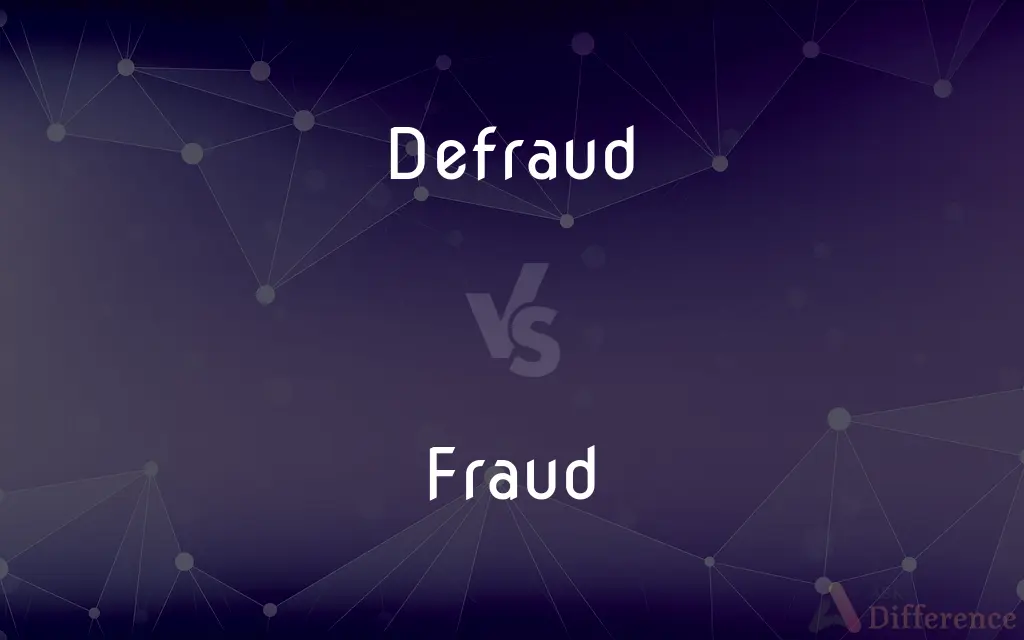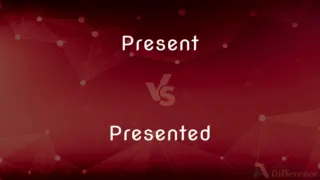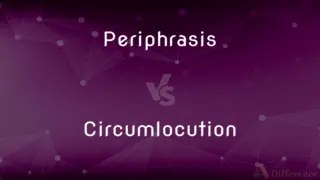Defraud vs. Fraud — What's the Difference?
By Urooj Arif & Maham Liaqat — Updated on March 24, 2024
Defrauding involves the action of wrongfully obtaining something by deception, while fraud is the broader concept encompassing any deceitful practice intended to gain an unjust advantage.

Difference Between Defraud and Fraud
Table of Contents
ADVERTISEMENT
Key Differences
Defrauding is the act of deliberately deceiving another individual or entity with the intention of gaining something of value or causing a loss to the other party. It involves a direct and active process of deception, often characterized by false representations or withholding crucial information. Fraud, on the other hand, is a wider term that refers to any deceitful conduct, misrepresentation, or trickery designed to manipulate another person or party into parting with money, property, or legal rights, thereby resulting in an unjust advantage to the perpetrator.
The process of defrauding is typically one aspect or method within the broader category of fraud. For example, defrauding someone might involve specific actions like forging documents or lying about one's qualifications to secure a job or loan. Fraud encompasses these actions but also includes a wide array of other deceitful practices, such as identity theft, Ponzi schemes, and internet scams.
Legally, both defrauding and fraud carry serious implications and are punishable offenses. However, the term "fraud" is more commonly used in legal contexts to describe a category of crime that includes various specific acts, including the act of defrauding. Legal charges might be brought under the umbrella of fraud for a wide range of deceptive practices.
The consequences of defrauding or being involved in fraud can be severe, including financial loss, damage to reputation, and legal penalties such as fines and imprisonment. While defrauding directly implicates an individual or group actively engaged in deception, being charged with fraud can involve either direct deception or complicity in deceptive practices.
In terms of prevention and detection, both defrauding and fraud require vigilance, skepticism, and due diligence. Measures to prevent defrauding specifically might focus on verifying information and identities, while fraud prevention can also include broader strategies like cybersecurity measures, financial controls, and public education about common scams.
ADVERTISEMENT
Comparison Chart
Definition
The act of deceiving to gain something unjustly
A broader category of deceitful practices for unjust advantage
Scope
Specific actions of deception
Includes various forms of deceit, including defrauding
Legal Implications
Considered a punishable offense
Encompasses various crimes, including defrauding
Consequences
Financial loss, legal penalties, reputation damage
Broad range of consequences depending on the type of fraud
Prevention/Detection
Verification of information, skepticism
Broad strategies including cybersecurity, financial controls
Compare with Definitions
Defraud
Specific charges under the broader fraud category.
Charged with defrauding elderly clients out of their savings.
Fraud
Encompasses a wide range of deceptive behaviors.
Internet scams and Ponzi schemes are types of fraud.
Defraud
Directly harms the victim financially or otherwise.
Victims of defrauding often face significant financial losses.
Fraud
Any deceitful practice for personal or financial gain.
Committing fraud through identity theft.
Defraud
Actively deceiving someone to gain an unfair advantage.
Defrauding investors by falsifying company earnings.
Fraud
Broad legal category with various offenses.
Fraud cases can involve complex legal proceedings.
Defraud
Involves direct, intentional deception.
He was caught defrauding the insurance company with fake claims.
Fraud
Can include a variety of harms, from financial to societal.
Fraud undermines trust in financial systems and institutions.
Defraud
Emphasis on verifying claims and credentials.
Rigorous background checks can prevent defrauding in hiring processes.
Fraud
Comprehensive measures, including education and cybersecurity.
Public awareness campaigns about common fraud schemes can help prevent victimization.
Defraud
To take something from by fraud; swindle
Defrauded the immigrants by selling them worthless land deeds.
Fraud
In law, fraud is intentional deception to secure unfair or unlawful gain, or to deprive a victim of a legal right. Fraud can violate civil law (e.g., a fraud victim may sue the fraud perpetrator to avoid the fraud or recover monetary compensation) or criminal law (e.g., a fraud perpetrator may be prosecuted and imprisoned by governmental authorities), or it may cause no loss of money, property, or legal right but still be an element of another civil or criminal wrong.
Defraud
(transitive) To obtain money or property from (a person) by fraud; to swindle.
Fraud
A deception practiced in order to induce another to give up possession of property or surrender a right.
Defraud
(archaic) To deprive.
Fraud
A piece of trickery; a trick.
Defraud
To deprive of some right, interest, or property, by a deceitful device; to withhold from wrongfully; to injure by embezzlement; to cheat; to overreach; as, to defraud a servant, or a creditor, or the state; - with of before the thing taken or withheld.
We have defrauded no man.
Churches seem injured and defrauded of their rights.
Fraud
One that defrauds; a cheat.
Defraud
Deprive of by deceit;
He swindled me out of my inheritance
She defrauded the customers who trusted her
The cashier gypped me when he gave me too little change
Fraud
One who assumes a false pose; an impostor.
Fraud
(law) The crime of stealing or otherwise illegally obtaining money by use of deception tactics.
Fraud
Any act of deception carried out for the purpose of unfair, undeserved and/or unlawful gain.
Fraud
The assumption of a false identity to such deceptive end.
Fraud
A person who performs any such trick.
Fraud
(obsolete) A trap or snare.
Fraud
(obsolete) To defraud
Fraud
Deception deliberately practiced with a view to gaining an unlawful or unfair advantage; artifice by which the right or interest of another is injured; injurious stratagem; deceit; trick.
If success a lover's toil attends,Few ask, if fraud or force attained his ends.
Fraud
An intentional perversion of truth for the purpose of obtaining some valuable thing or promise from another.
Fraud
A trap or snare.
To draw the proud King Ahab into fraud.
Fraud
Intentional deception resulting in injury to another person
Fraud
A person who makes deceitful pretenses
Fraud
Something intended to deceive; deliberate trickery intended to gain an advantage
Common Curiosities
5. How do authorities combat fraud?
Authorities use a combination of legal measures, investigative techniques, and public education to combat fraud.
2. What are common methods of defrauding?
Common methods include false representations, manipulating information, and forgery.
7. What role does intent play in fraud?
Intent is crucial in fraud cases, as the perpetrator must knowingly engage in deceitful practices to gain an advantage.
6. Can companies commit fraud?
Yes, companies can commit fraud, such as through misleading advertising, accounting fraud, or other deceitful business practices.
8. How can individuals protect themselves from fraud?
Individuals can protect themselves by being informed, skeptical of too-good-to-be-true offers, and verifying information before making decisions or transactions.
14. How do social engineering scams relate to fraud?
Social engineering scams manipulate individuals into divulging confidential information or performing actions that lead to fraud.
4. What is the difference between fraud and a scam?
A scam is a fraudulent scheme performed by a dishonest individual, group, or company in an attempt to obtain money or something else of value, often considered a type of fraud.
13. What is wire fraud?
Wire fraud involves using electronic communications to carry out fraudulent schemes, such as through email, phone, or internet.
3. Is all fraud illegal?
While most fraudulent activities are illegal, some deceitful practices may not meet the legal criteria for fraud but are still unethical.
1. Can defrauding be considered a type of fraud?
Yes, defrauding is a specific action that falls under the broader category of fraud.
9. Are there victimless frauds?
While some may consider certain frauds to be victimless, most have direct or indirect victims, such as financial institutions, individuals, or society at large.
11. Can fraud occur online?
Yes, online fraud is prevalent and includes activities such as phishing, identity theft, and various types of internet scams.
10. What is the impact of fraud on the economy?
Fraud can have a significant negative impact on the economy by undermining trust in financial systems, causing financial losses, and diverting resources from productive uses.
12. Is it possible to recover losses from fraud?
Recovery of losses depends on the situation, but it can be challenging and often requires legal action or intervention by financial institutions.
15. What are the psychological effects of being a fraud victim?
Victims of fraud can experience a range of psychological effects, including stress, anxiety, loss of trust, and damage to self-esteem.
Share Your Discovery

Previous Comparison
Present vs. Presented
Next Comparison
Periphrasis vs. CircumlocutionAuthor Spotlight
Written by
Urooj ArifUrooj is a skilled content writer at Ask Difference, known for her exceptional ability to simplify complex topics into engaging and informative content. With a passion for research and a flair for clear, concise writing, she consistently delivers articles that resonate with our diverse audience.
Co-written by
Maham Liaqat













































